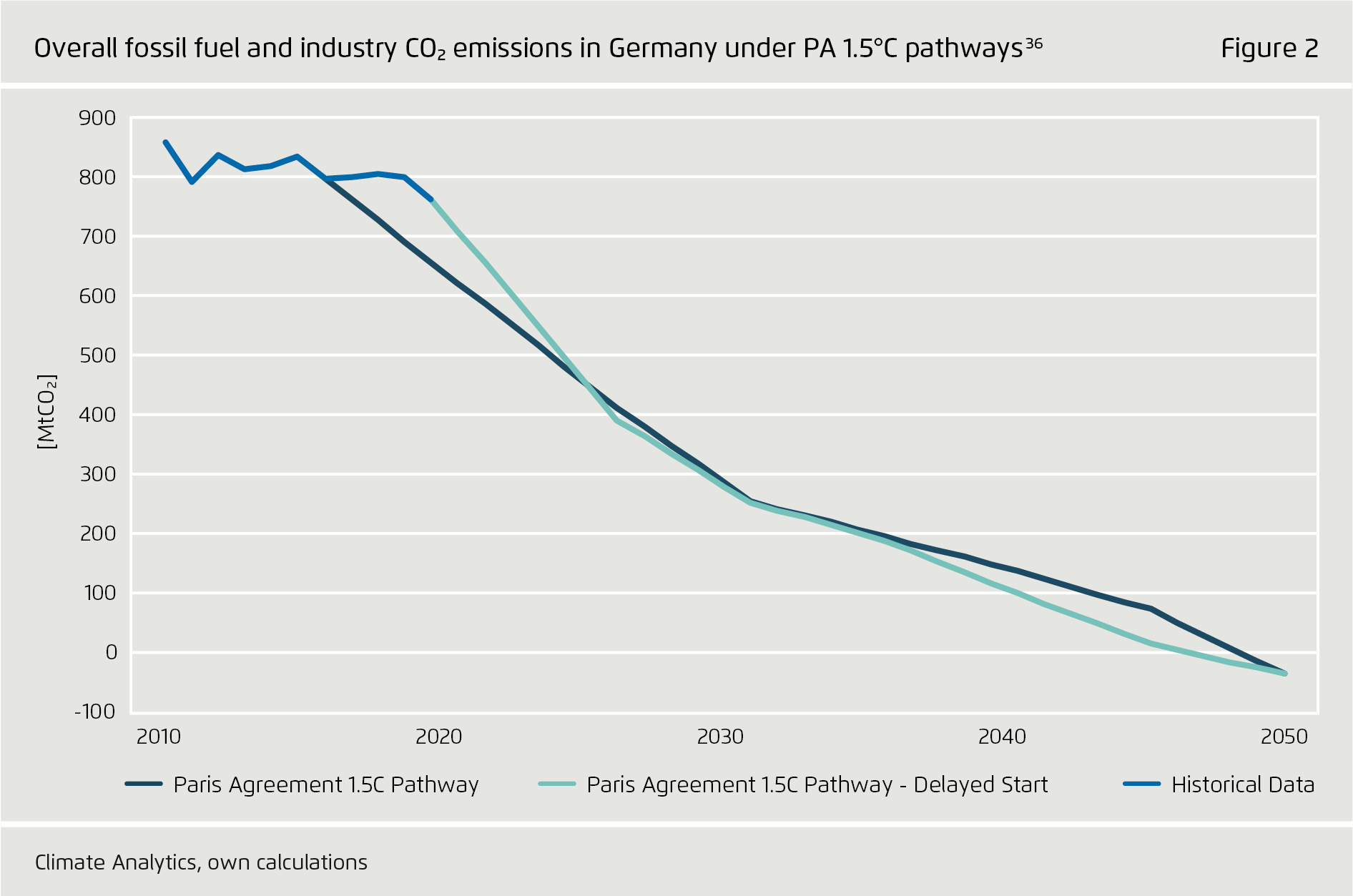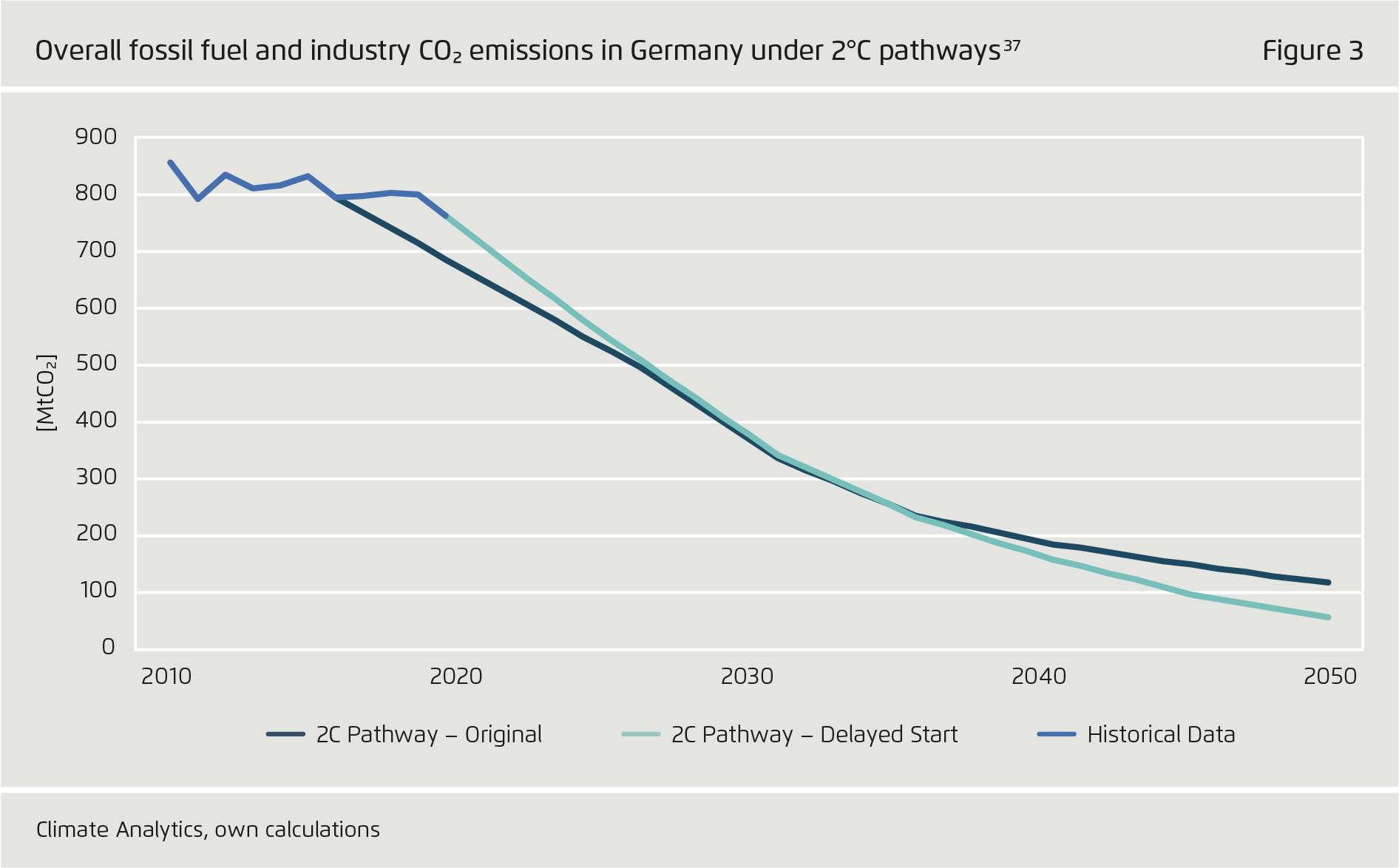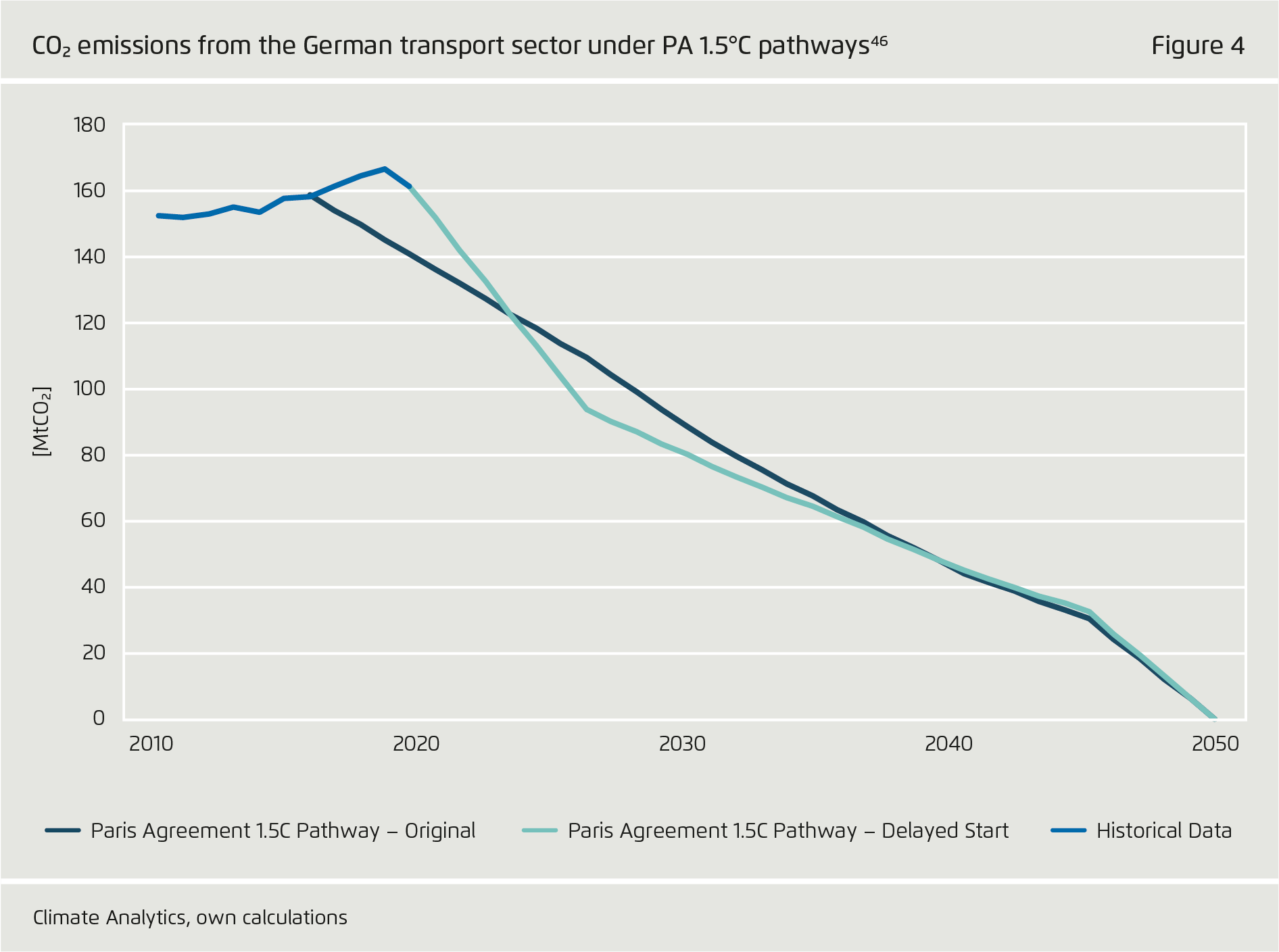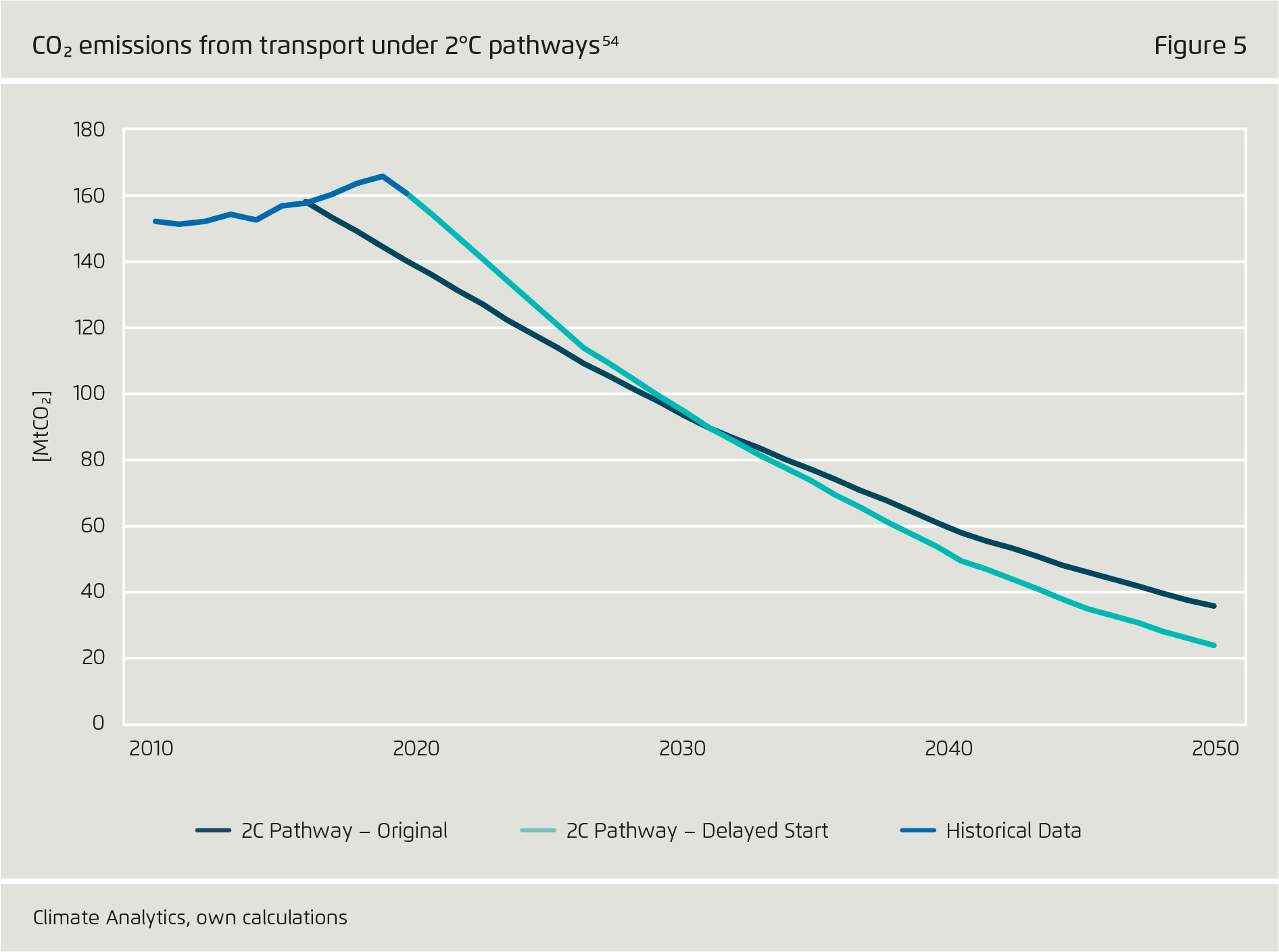-
To do its part in meeting the Paris Agreement targets, Germany must rapidly reduce its greenhouse gas emissions across all sectors.
In its Special Report on Global Warming of 1.5°C, the IPCC identified mitigation pathways consistent with the Paris Agreement. From these, national and sectoral carbon budgets and emissions pathways can be derived that minimise overall global mitigation costs. For a least-cost pathway for limiting global warming to 1.5°C, Germany has to reduce its total domestic greenhouse gas emissions by 73 per cent by 2030 and by 98 per cent by 2050 relative to 1990 levels. The least-cost pathway for limiting global warming to 2°C would require Germany to cut its emissions by 68 per cent by 2030 and by 90 per cent by 2050.
-
Germany and the EU will have to raise their medium-term reduction targets if they are to be compatible with the Paris Agreement.
Germany currently aims to reduce its domestic greenhouse gas emissions by 55 per cent by 2030. This is now not enough: Germany needs to set its sights on a more ambitious target. Moreover, it must urge the EU to significantly increase its current 2030 reduction target of 40 per cent. The Paris Agreement and Germany’s Climate Action Plan 2050 require both to present these new, more ambitious plans in 2020.
-
A massive escalation of mitigation efforts is needed in the transport sector. Currently, Germany’s Climate Action Plan calls for the reduction of transport sector emissions by 40–42 per cent by 2030.
This goal is inconsistent with the Paris Agreement targets. For Germany to be on a least-cost pathway to keeping global warming below 1.5°C, its transport sector emissions need to fall by 53 per cent by 2030 relative to 1990 levels. Even limiting global warming to 2°C would require Germany to reduce its transport emissions by 44 percent by 2030. With the current policy trend, transport sector emissions in 2030 will be more than double the level permissible under the least-cost Paris Agreement 1.5°C pathway. If current trends continue beyond 2030, the German transport sector will have released, cumulatively, 5.4 billion tonnes of CO2 between 2016 and 2050. This figure is more than twice the transport sector carbon budget of 2.6 billion tonnes consistent with staying on the 1.5°C pathway and still well beyond the 2°C pathway budget of 3 billion tonnes.
-
For the sake of climate equity, Germany’s overall mitigation contribution needs to be higher than the level required by a least-cost emissions reduction pathway.
In order to contribute its fair share to meeting the 1.5°C target, Germany would have to reduce its emissions – according to a central estimate – by 87 per cent by 2030 relative to 1990 levels. This exceeds its least-cost domestic reduction target by around 14 percentage points. Germany could close this gap by, for example, increasing its funding for international mitigation efforts.
-
Fast reductions of transport sector emissions and its full decarbonisation by 2050 are possible.
Key elements in achieving these goals are a strongly accelerated electrification of passenger and freight transport linked to an intensified expansion of renewable electricity generation, a switch to public transport and other more sustainable forms of travel (such as walking or cycling), an increase in rail freight, and an overall more efficient organisation of the transport sector overall. To this end, alongside infrastructural and regulatory measures, pricing instruments – effective carbon pricing in particular – are of central importance.
This content is also available in: German
En route to Paris?
Implications of the Paris Agreement for the German transport sector

Preface
When the global community ratified the Paris Agreement four years ago, its goal was to hold global warming well below 2°C and to pursue efforts to limit it to 1.5°C above pre-industrial levels. Yet global greenhouse emissions in the ensuing years have continued to hit record levels. To put it bluntly, the climate measures taken so far have been woefully inadequate, and the Paris targets risk slipping out of reach.
This ever-widening gap between what the global community is doing and what it needs to be doing was one of the reasons for undertaking this project. We wanted to know more about Germany’s role in closing this gap and therefore commissioned a study to determine whether the country in general and its transport sector in particular are on track to meet the Paris targets.
The study’s findings are a sobering read. The package of climate-related measures that the government recently put into effect hardly suffices to reach Germany’s own 2030 targets, let alone those needed to keep global warming below 1.5°C. On its current course, Germany would not even meet the previous target of 2°C, which was the global standard before the Paris Agreement.
The new EU Commission, under the leadership of Ursula von der Leyen, plans to recommend within the next 100 days that Europe significantly increase its greenhouse gas reductions targets for 2030, from the current 40 per cent to 50–55 per cent relative to 1990 levels. The German presidency of the European Council in the second half of 2020 and the scheduled revisions of the National Determined Contributions (NDCs) for 2020 offers Germany the opportunity to finally make good on its Paris Agreement commitments. But Germany must not only ensure that its emission targets are consistent with the Paris goals. It must enact the measures needed to reach them.
This study identifies how quickly emissions must fall for the Paris climate targets to be achievable. Further reductions for 2030 represent an immense challenge, especially in the transport sector, whose emission levels have changed little since 1990. But anyone who is serious about fighting global warming must be ready to take on this challenge.
Key findings
Bibliographical data
Downloads
-
pdf 2 MB
En route to Paris?
Implications of the Paris Agreement for the German transport sector
All figures in this publication
Illustration of the three stages to achieve the PA LTTG
From En route to Paris? on page 1
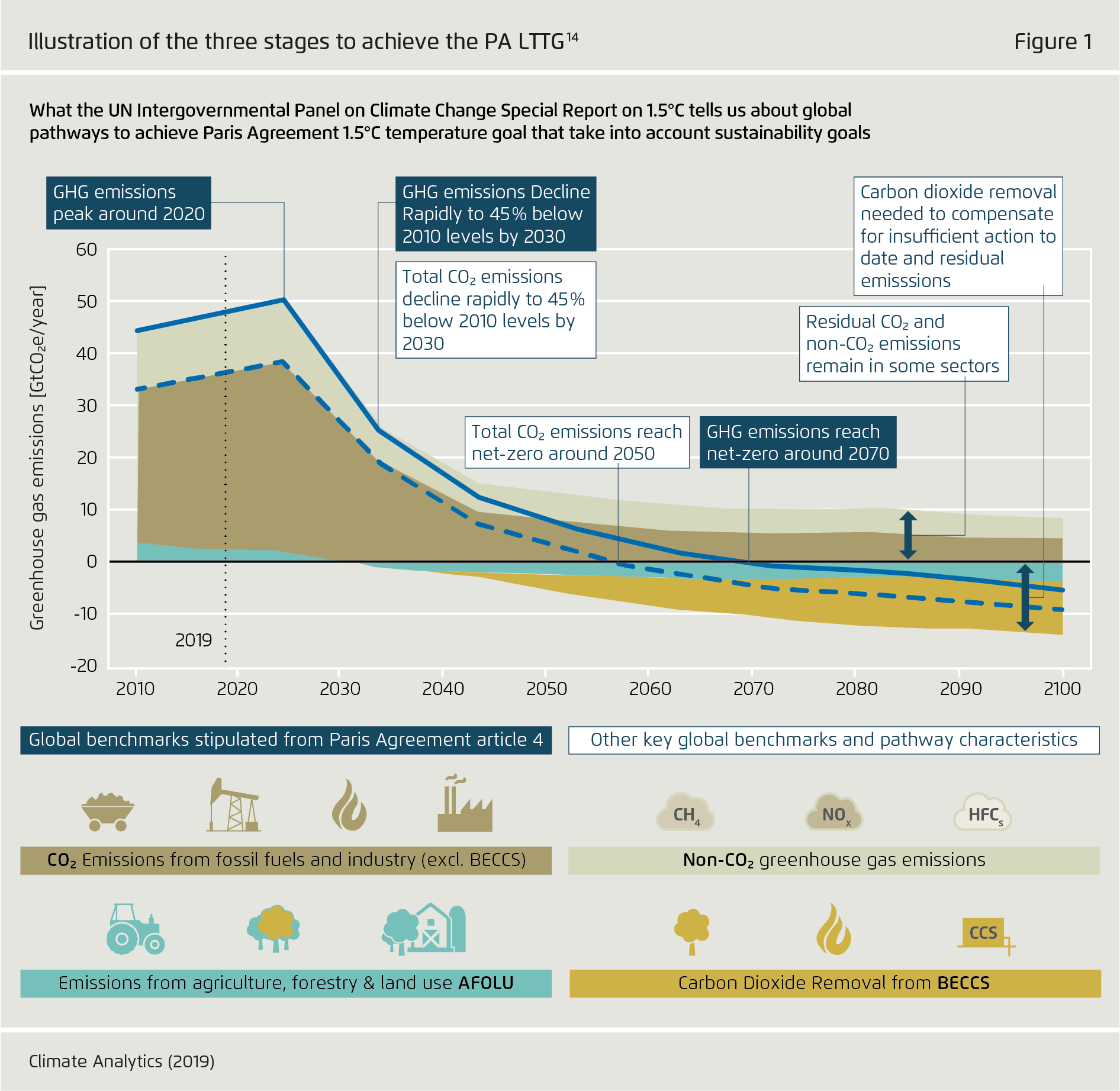
Overall fossil fuel and industry CO2 emissions in Germany under PA 1.5°C pathways
From En route to Paris? on page 2
